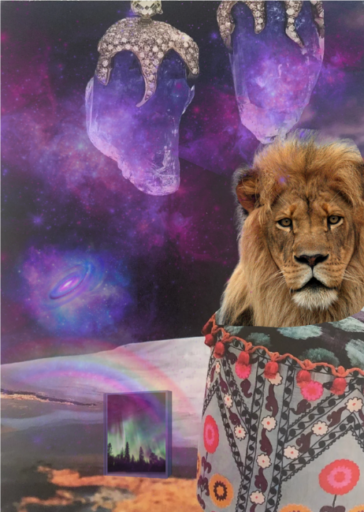Ladylight
My first thought is drugs—some weed or hash—
the drawstring pouch forgotten in a stoned haze
or tossed in a bust panic toward the creek
beside the greenway where I walk every day.
Threadbare, blue faded almost white, heavier
than I expected, I’m guessing a pipe is in there, too,
but no, it’s a crystal the size of a child’s pinky,
and a lined sheet of paper folded as tightly
as origami into a pyramid. The reveal is large,
loopy handwriting, i’s dotted with hearts,
addressed to Ladylight, asking her to “be our guide
and stand by our side.” More rhymes beseech
the four winds and the spirits of water, fire,
and earth “to cast a bubble of protection
around this sacred place and every inhabitant.”
I don’t think much of spirits, the Universe, or God,
what they bestow or want. The signs I believe in
say Bridge Ices Before Road, Beware of Dog, Hard
Hats Required, Choking Hazard. Yet how can I not
be charmed by the sweet trust I’m holding—the bag
and crystal in one hand, heartfelt spell in the other.
I don’t want to leave it behind. And I don’t want
to take it from its altar, either. The creek bubbles
and froths in its rush to join the river, a siren
blares toward me, or away, I can’t tell which.
I turn back to the greenway, empty handed,
save for the slight heat lingering in my palms.

His Art
Everyone is charmed by Birthday Wish,
the renowned photographer’s black and white
close-up of a girl’s delicate face above eight candles,
eight small flames rushing away from her pursed lips
directly toward the viewer. Below the girl’s dark bangs,
her dark eyes brim with reflected fire.
To create that moment
the artist, the girl’s father, kept adjusting his equipment
and changing instructions. He relit the candles again
and again and told her when to blow. Each time,
she made a new wish. The ice cream carton sweated
on the table. Hot wax dripped into the cake. The other
children grew restless. One cried.
The girl’s mother shushed and ushered them outside.
Later that day, or maybe another, she can’t remember now,
after he came from his darkroom he dropped
his Mustang’s ragtop and drove her and her friends
to Swenson’s, their hair and laughter whipping in the wind.
He gestured to the menu on the wall, the columns of shakes
and splits and sundaes. In his big voice he announced
they could have anything they wanted, anything at all.

Beauty Loves Friction
1.
Not a cloud in the sky we say,
like that’s a good thing. Like emptiness
is the goal. Like lack makes the sky
beautiful. But it’s friction–white
against blue, shape-shifting
against shapeless, chance of rain
against no chance.
The Royal Cloud Society says
an elephant is what we see
most often in clouds. Sometimes
a whole fog-colored herd
shuffling across the dry plain.
What to make of a cloudless sky?
Endless canvas, not a dab of paint.
2.
The voice of Joan Baez—so without edge,
or grit—so like a cloudless sky.
Not the songs themselves—
Joe Hill, The Night They Drove Old Dixie Down,
Diamonds and Rust, plenty of friction there—
but her voice, smooth as polished silver—
even those fight songs have no fight in them.
3.
My pre-teen says he knows about sex—the penis
in the vagina. But he doesn’t get the moving,
the back-and-forth.
I say it’s kind of like picking your nose.
Once your finger is in, you move it
until you get what you came for. Without friction,
nose picking and sex are anti-climactic.
4.
Lee’s still life—green pears in a blue bowl
on a yellow and red striped tablecloth
hanging gracefully off the tabletop.
Lying beside the bowl—black ear buds attached
to black snaky wires. I never get tired of seeing
that clash of old school and new, the third rail
it makes, the voltage impossible to ignore.
5.
At the beach, it’s not the flat as sky surface,
the monochrome, the nothing-changes lull
we love, it’s the disturbance—the dolphin pod
suddenly wheeling through the water—the there-
not-there of sunset, the pelicans, gulls, terns
entering your view, exiting. The tanker growing
smaller and smaller until it falls off the edge.
We want the disruption, the sense of loss after.
6.
The tall Japanese maple in my neighbor’s yard
stuns when it blazes red in the fall. But the more
I see it the more I don’t see it. It’s Joan Baez’s voice—
no modulation, no oyster-pearl irritant. Except today,
when the old, really old, Honda Civic appeared
beneath the maple. Dented, slightly lopsided, white
paint dingy with fade and dirt. The eyesore car
and the elegant tree side by side,
its wrongness becoming
its disturbing rightness.
7.
Sick a long time, old, you feel your grip
slipping. Like nothing is keeping you attached
to the single pane surface of the world, like those
gummy window decorations at Halloween,
the happy ghosts and skeletons. It doesn’t take long
for the friction keeping them affixed to weaken.
A foot curls upward. An arm unsticks, dangles.
The head lolls onto the ribs.
The whole boney body falls to the floor.
Maybe a tacky ghost remains. A little cleaner
and some firm pressure wipes it away.
Eric Nelson: “These poems are from a new manuscript I’m slowly putting together. No working title yet, but some of the poems have appeared or are forthcoming in Rattle, Valparaiso Review, Autumn Sky Poetry Daily, and others. My previous books include Horse Not Zebra (Terrapin Books, 2022); Some Wonder (Gival Press, 2015), Terrestrials (Texas Review Press, 2004), and The Interpretation of Waking Life (Arkansas, 1991). My poems have also appeared in many journals, including The Sun, Oxford American, Poetry, The Southern Review, Verse Daily, and Poetry Daily. Since 2015, my wife and I have lived in Asheville, NC, after a long career teaching writing and literature at Georgia Southern University.”
